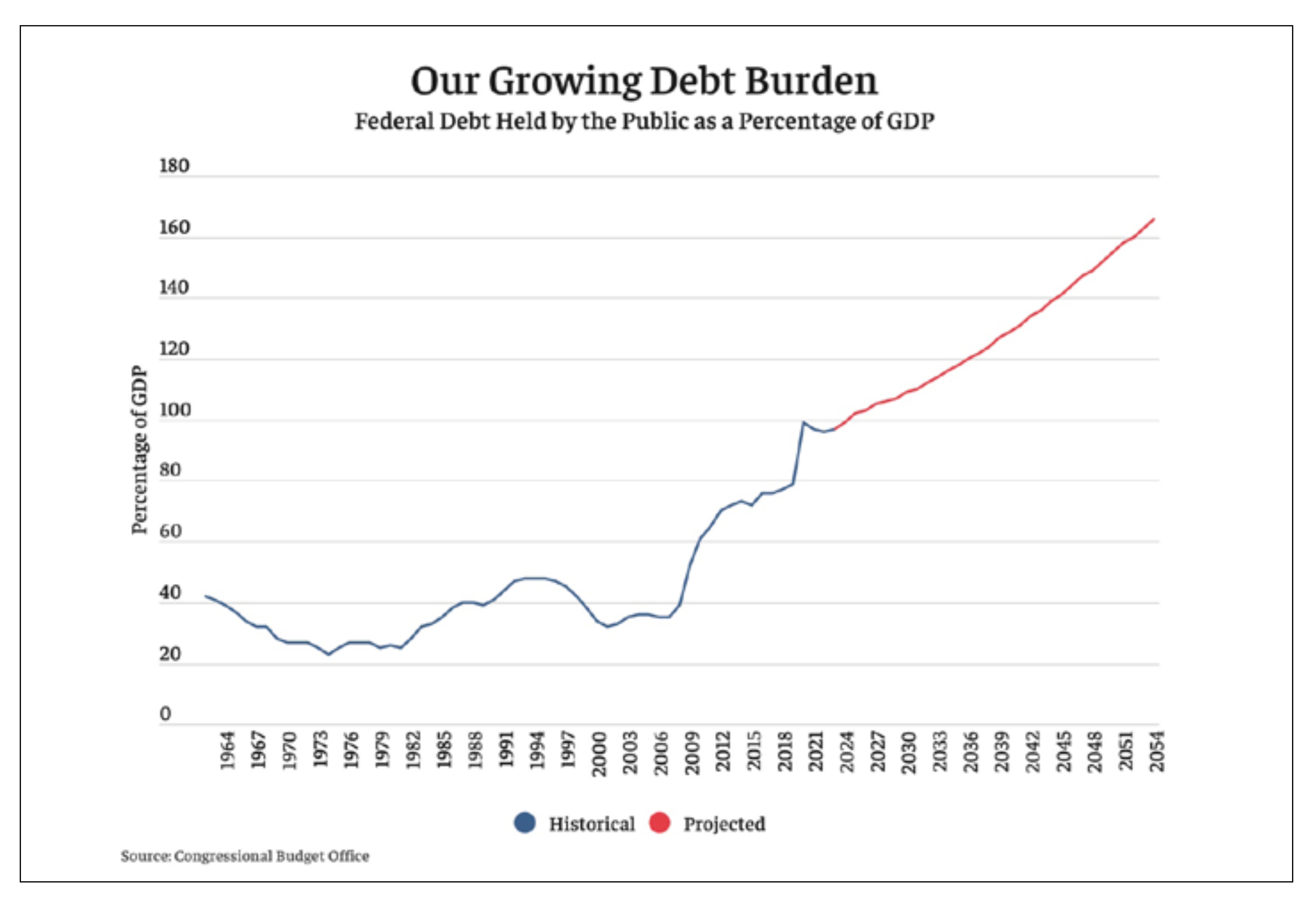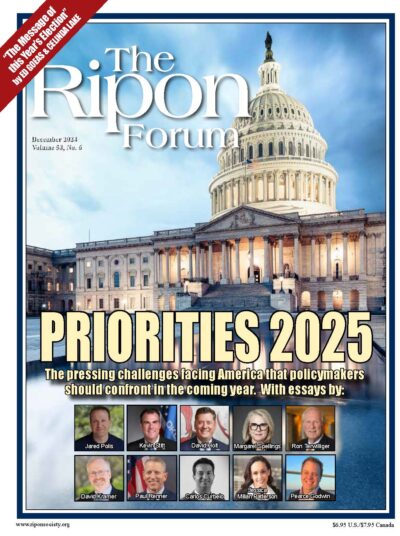
The election victory for President-elect Trump and Republicans wasn’t the only headline last month. Our national debt surpassed $36 trillion, marking a sobering moment for our nation’s fiscal health. Voters placed their trust in these new leaders to create lasting opportunities for all Americans, but they will need to take action to restore fiscal responsibility before this enormous debt further impacts hardworking Americans.
Our national debt already casts a long shadow, impacting the economy and every American household. Interest on the debt is now the second largest annual expenditure of the federal government, behind only Social Security. Since 2000, every American’s share of the debt has more than tripled, reaching $78,000 and surpassing the average U.S. household income.
Left unchecked, our growing financial burden will squeeze families and small businesses by keeping interest rates elevated, slowing economic growth, and contributing to worsening financial inequality.
That squeeze is particularly evident in the housing market, which is already under intense pressure.
Left unchecked, our growing financial burden will squeeze families and small businesses by keeping interest rates elevated, slowing economic growth, and contributing to worsening financial inequality. That squeeze is particularly evident in the housing market…
Fewer homebuilders and tighter lending requirements caused the U.S. to underbuild housing by millions of homes since the Great Recession, leaving the market unable to meet growing demand and driving prices even higher. Supply chain disruptions of critical homebuilding materials during the COVID-19 pandemic further impeded housing construction. Rising mortgage rates have also led to a “lock-in effect,” in which homeowners with favorable rates are unwilling to move and free up inventory. The result: Since 2000, housing prices have surged 174%, more than twice the rate of overall inflation.
This rapid escalation leaves many Americans struggling to save or invest in their futures, as a disproportionate share of their income goes toward housing. The dream of homeownership — a bedrock of middle-class prosperity — is being pushed further from reach with each passing year.
As the national debt surges, investors in U.S. Treasury bonds will demand higher interest rates to account for additional supply and elevated risk. Because mortgage rates fluctuate with Treasury rates, prospective homeowners will find it increasingly difficult to enter the market or move, exacerbating affordability challenges affecting families across the economic spectrum.
Homebuilders, already navigating regulatory hurdles at the state and local levels, now may face rising borrowing costs linked to the national debt. This increase in the cost of capital would make construction more expensive, further limiting the supply of new homes.
The unchecked rise in the national debt also poses a severe risk to federal programs designed to ease housing affordability for low-income households. As the debt swells and federal budgets become increasingly constrained, we will face difficult choices between making interest payments to countries like China and funding for domestic discretionary programs including the Low-Income Housing Tax Credit or the housing choice voucher program. Without these programs, millions of Americans will face even greater housing challenges.

We need Congress to commit to a comprehensive, long-term strategy that will relieve our debt burden and these pressures on the housing market to ensure access and opportunity for Americans.
The stakes couldn’t be higher, and the solutions are anything but simple. But our debt is a bipartisan creation that requires bipartisan solutions. We need Congress to commit to a comprehensive, long-term strategy that will relieve our debt burden and these pressures on the housing market to ensure access and opportunity for Americans. The longer we delay action, the deeper the financial hole becomes.
President-elect Trump and Congress have a unique opportunity next year to make progress toward getting our fiscal house in order by responsibly addressing the reinstatement of the debt limit in January and the expiration of the 2017 Tax Cuts and Jobs Act in December. Tackling our fiscal challenge will demand tough choices about federal spending and revenues, government efficiency, and the larger structural drivers of our debt, but doing so is essential to protecting our economic stability, safeguarding America’s global leadership, and securing future opportunities for every American.
Ultimately, reducing the national debt isn’t just about balancing the books. Our debt impacts all aspects of federal policy and investment. We need to address our fiscal health today so we can continue to invest in tomorrow. We must leave behind a legacy of opportunity — not a mountain of debt — for future generations. The longer we wait to act, the harder this problem will be to solve.
Congress and the incoming Trump administration must begin to make tough choices to control our debt and safeguard the housing market for all Americans. The longer we wait, the higher the cost — to our economy and to the American dream itself.
Margaret Spellings is president and CEO of the Bipartisan Policy Center and a former domestic policy advisor to President George W. Bush. Ron Terwilliger is the founder of BPC’s J. Ronald Terwilliger Center for Housing Policy and Chairman Emeritus of Trammel Crow Residential.




